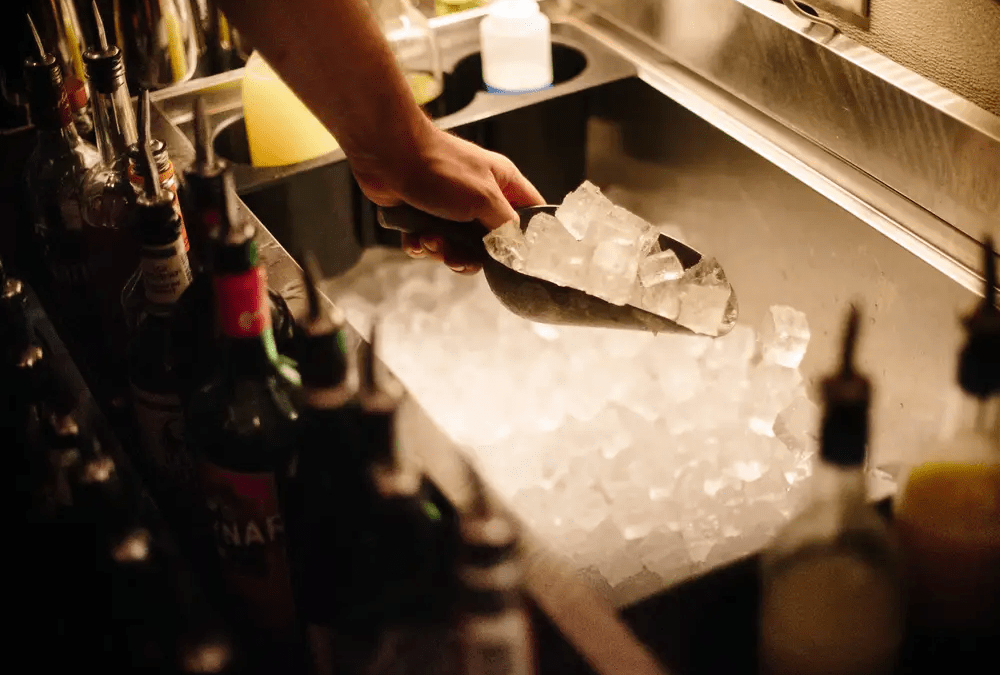When sitting at a bar ordering drinks, have you ever watched how the bartender constructs the cocktails? We can imagine how they make a big show of pouring the spirits into the shaker, mottling the fruits or aromatics, and even the sound of the ice as it hits the sides of the tumbler, but did you notice how the bartender scooped the ice out of the ice maker? Did they use a glass? Most people don’t even think to look but this is actually one of the most subtle signs of a well-trained bartender. A skilled bartender will only ever use a clean ice scoop, holding it only by the handle, before putting it into the ice machine and then pouring the ice into the cocktail shaker. This is because according to the FDA, ice must be treated like food, as it can be a source of foodborne illness if bar staff don’t follow proper ice safety solutions. According to the Code of Federal Regulation Title 21, Volume 8, Section 1250.28: “All ice coming into contact with food or drink shall be stored and handled in such manner as to avoid contamination.” Contamination can be introduced by airborne particles, contaminated water supply, food handlers, or dirty utensils, but the main cause of ice in restaurants, bars and hotels becoming contaminated is human error: improper ice handling. If you are a bar owner or restaurant purveyor, there are several tips for training your staff on proper ice safety solutions. They include:
- Wash hands before getting ice from the ice machine
- Hold only the ice scoop handle and not other parts of the scoop
- Do not scoop ice using water glasses or cups and never handle ice with hands
- Do not return unused ice to the ice machine
- Keep doors of the commercial ice machine closed except with removing ice
- Ice scoops should be stored outside the ice maker and kept in a clean container.
- Ice scoop and container should be washed and sanitized regularly
- Do not store anything such as food, drinks, fruit, etc. in the ice machine and never use the ice machine as a refrigerator
- Clean the ice machine regularly and fix all problems identified
- Never put anything in the ice bin except clean, untouched ice
Another part of providing clean ice free of contaminants and following FDA regulations is to regularly inspect, clean, and sanitize the ice making equipment. This can be done free of hassle and up to standards by contacting your local commercial refrigeration company like SPECS Refrigeration in Lubbock, TX, who can provide top quality ice machine sanitization as well as skilled service for any repairs needed. Ice machine service should be performed by a professional technician at least twice per year. This requires taking apart the ice machine for inspection, plus major cleaning and sanitizing. A typical cleaning routine would include the following steps:
- Turn off the ice machine electrical supply and empty your ice storage bin.
- Remove the protective curtain or cover (if present) and check the drain to ensure it is clear.
- Clean all surfaces inside using hot water and a cleaner or detergent, follow with an antibacterial sanitizer by wiping all internal surfaces and allow adequate contact-time for the sanitizer to work. (Tip: Do not rinse off the surfaces, allow to air dry)
- Wash and sanitize the plastic curtains, cover, ice scoops etc. (Tip: Use hot water and detergent for washing and then soak in a sterilizing solution per manufacturer’s instructions)
- Check the door and ensure it can close tightly to prevent dirt entering the ice making machine.
- Switch the machine back on and ensure it works properly.
Other ways to preserve the life of your ice machine and enhance its efficiency are to ensure proper ventilation and store the machine in a place with mild ambient air temperature. An ice machine needs to work harder if it struggles to intake air, is intaking air filled with particles, or is intaking air that is too hot or too cold. All of these situations will cause more wear and tear of the machine as well as eventual slowed or reduced ice production. If the machine is in a room with high humidity, this can cause condensation inside the machine, encouraging rapid mold growth.
If your bar/restaurant is not outfitted with a reverse osmosis water filtration system, it is very important to install a high-quality water filter on water flowing into the ice machine. This is important not only to the life of the machine, but the quality and taste of the ice itself and the drinks being served.
SPECS Refrigeration’s recommendation for ice machine water filtration is the Everpure i2000 from Pentair. These filters are specially designed for ice machines and help produce the best quality ice possible as well as reducing water-related ice machine problems caused by scale buildup from dirt and dissolved minerals. They can be used with a variety of machines and have a wide range of models to fit your needs. For more information on products or services for your current Ice machine or upgrading a new model, call SPECS Refrigeration in Lubbock, TX and a skilled technician will take care of your needs.


Recent Comments